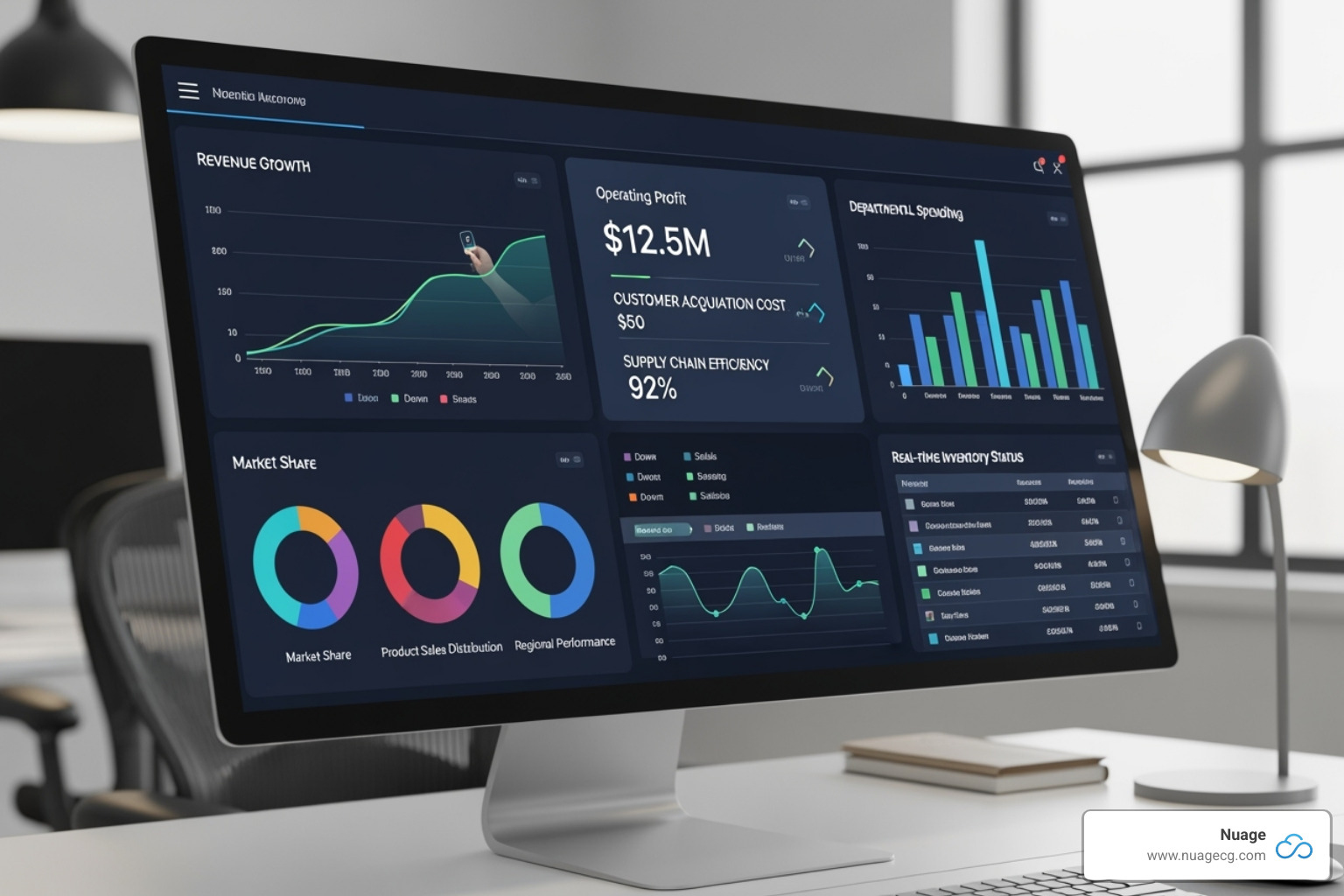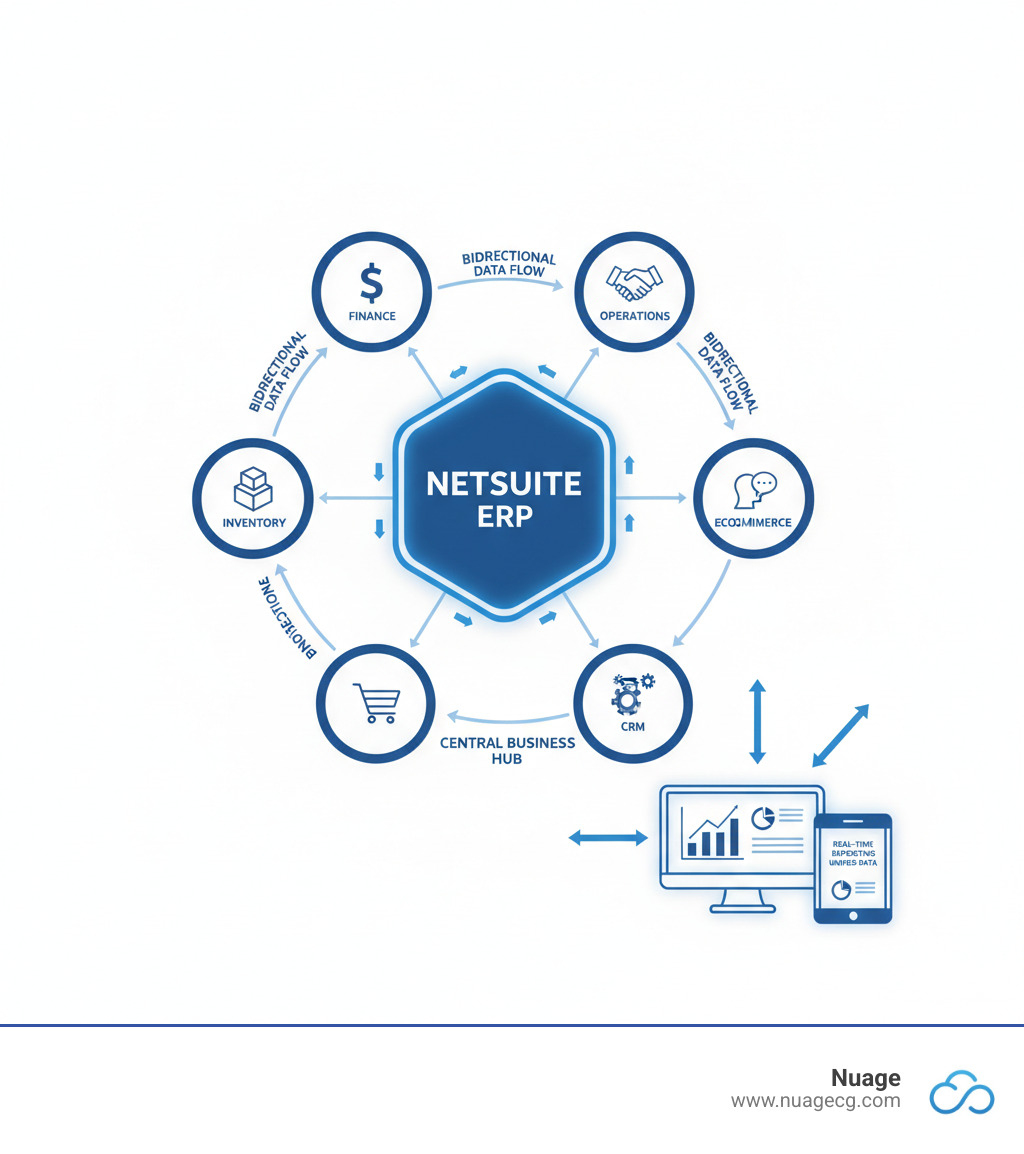Why Enterprise Resource Planning NetSuite Matters for Modern Business

Enterprise resource planning netsuite is a comprehensive, cloud-based business management solution that integrates core functions into a single platform. Used by over 43,000 organizations, NetSuite ERP replaces disconnected systems and spreadsheets, providing real-time visibility into all business operations.
Quick Definition: What is NetSuite ERP?
- Platform: Cloud-native, all-in-one business management suite.
- Functions: Finance, inventory, orders, procurement, CRM, and ecommerce.
- Benefits: Single database, real-time data, scalable modules, automatic updates.
- Users: Growing businesses from startups to enterprises.
- Deployment: True cloud SaaS model supporting 190+ currencies and 27+ languages.
Growing companies inevitably outgrow spreadsheets and disparate tools. NetSuite provides the infrastructure to manage complex operations with the agility to adapt and grow. Its power lies in connecting finance, sales, inventory, and operations into one seamless workflow, changing how businesses operate.
With over 15 years in digital change and enterprise resource planning netsuite optimization, I’ve seen how the right ERP implementation opens up growth. At Nuage, we specialize in helping organizations bridge the gap between NetSuite’s potential and their actual results, turning a powerful tool into a true competitive advantage.

What is NetSuite? The All-in-One Cloud ERP Platform
In 1998, a startup called NetLedger pioneered delivering business applications over the internet. That company became NetSuite, the enterprise resource planning netsuite solution now used by over 43,000 organizations. Acquired by Oracle in 2016, NetSuite was built from day one with a cloud-native architecture.
This means instead of juggling separate systems for finance, supply chain, HR, and ecommerce, you get everything in one place: one database, one source of truth. When a sales deal closes, inventory and finance records update instantly. This real-time visibility is essential for making quick, informed decisions. As your business grows, NetSuite scales with you, eliminating the need to replace core systems. Companies from startups to global enterprises trust it to support their growth.
Want to see it in action? Check out this video:
What is NetSuite ERP and How Does It Work? (Video)
For more in-depth information about how NetSuite can transform your business, explore our NetSuite solutions.
The True Cloud Difference
Not all cloud solutions are the same. Many legacy systems were simply moved to a server and relabeled as “cloud.” NetSuite was built from the ground up for the cloud as a true SaaS model.
This means NetSuite manages the servers, software patches, and system upgrades. Your team is freed from IT maintenance to focus on business growth. Its multi-tenant architecture ensures all users are on the same version, receiving two major, seamless updates per year with the latest features and security. This model eliminates large upfront hardware costs and allows your team to access the system from anywhere, on any device.
Let’s look at how this compares to traditional systems:
| Feature | Cloud-Native ERP (NetSuite) | Traditional On-Premise ERP |
|---|---|---|
| Deployment Model | SaaS (Software-as-a-Service) | Installed and managed on-site |
| Infrastructure | Vendor-managed servers and updates | You handle hardware, software, and maintenance |
| Accessibility | Anywhere, any device with internet | Limited to company network and specific devices |
| Updates & Upgrades | Automatic, frequent, seamless | Manual, costly, disruptive, often delayed |
| Cost Structure | Subscription-based, lower upfront | High upfront fees, significant IT overhead |
| Scalability | Highly scalable, vendor manages capacity | Limited by your physical infrastructure |
| IT Resource Focus | Business innovation | System maintenance and support |
| Time to Value | Faster implementation, quicker ROI | Longer implementation cycles, slower ROI |
| Security | Enterprise-grade, vendor-managed | You’re responsible for all security aspects |
Core Features That Drive Efficiency
The power of enterprise resource planning netsuite comes from features that eliminate operational chaos.
- Unified View: See your entire business—finance, inventory, customer data—in one place. Everyone works from the same accurate, real-time information.
- Native Integrations: NetSuite’s applications are built to work together, sharing data automatically from a central database and eliminating manual reconciliation.
- Deep Reporting: Turn unified data into actionable insights. Customizable dashboards help you monitor key metrics and make data-driven decisions.
- Built-in Flexibility: The system adapts to your unique business processes through configuration and the SuiteCloud platform.
- Role-Based Dashboards: Each user sees the specific information relevant to their role, from sales pipelines to financial reports, all drawn from the same unified system.
For a deeper dive into these powerful features and more, visit NetSuite’s official product page.
Deconstructing NetSuite: Core Components and Modules

Think of enterprise resource planning netsuite as a set of powerful, interconnected modules for your business. Its modular architecture, built on a central database, allows you to start with what you need and add functionality as you grow without replacing your entire system. The ecosystem also includes thousands of SuiteApps from certified partners, offering specialized functionality for nearly any industry or business need.
Ready to explore what’s possible? Check out our complete NetSuite Solutions to see how these modules can transform your operations.
Financial Management
NetSuite’s financial management module is the core of the system, automating tasks and providing critical insights. It streamlines core accounting processes, including the general ledger, accounts receivable/payable, and tax management, reducing manual entry and errors.
The real power lies in financial reporting, which offers real-time visibility into cash flow, profitability, and other key metrics, enabling faster, data-driven decisions. Add-on modules like Bill Capture and AP Automation further streamline the invoice-to-pay process, cutting costs and improving efficiency.
Want to see these capabilities in action? Watch this NetSuite Financial Management overview, or dive deeper into the Bill Capture module and AP Automation features.
Supply Chain and Operations
For businesses with physical products, NetSuite provides real-time visibility and control over the entire supply chain.
- Inventory Management: Gain a single view of inventory across all locations and channels. Optimize reorder points and reduce excess stock. See it in action with this NetSuite Item Management video.
- Order Management: Automate the entire order-to-cash process, from customer purchase to fulfillment, improving cash flow and customer satisfaction. This NetSuite Order Management demonstration shows how.
- Procurement: Streamline the procure-to-pay process to negotiate better prices, reduce costs, and gain visibility into vendor performance. See how it works in this NetSuite Purchase Management overview.
- Warehouse Management (WMS): Optimize warehouse operations with mobile functionality for picking, packing, and cycle counting.
- Manufacturing: Manage the complete production lifecycle, including planning, scheduling, and quality assurance, for greater efficiency and control.
Customer Relationship Management (CRM)
NetSuite’s CRM is fully integrated with its ERP, providing a complete view of every customer relationship. Sales force automation streamlines pipeline management and forecasting, while marketing automation helps nurture leads and measure campaign ROI.
Customer service management tools ensure timely support and resolution. The true power is the 360-degree customer view, which combines sales, service, and financial history in one profile. This gives all teams—from sales to support—the context they need to provide excellent service. For businesses using other systems, we also help with solutions like the Salesforce NetSuite Connector.
Global Business Management (OneWorld)
NetSuite OneWorld simplifies the complexity of running a global business. It allows you to manage multi-subsidiary operations and consolidate financials in real-time. With support for over 190 currencies and automated global tax compliance for 100+ countries, OneWorld removes the manual effort from international finance. This provides instant visibility into worldwide operations, empowering businesses to operate with local agility and centralized control.
The Strategic Advantages of Enterprise Resource Planning with NetSuite

Choosing enterprise resource planning netsuite is a strategic decision that fundamentally changes how a business operates. A thoughtful implementation turns NetSuite into the central nervous system for your company, driving agility and data-driven decisions. Instead of reconciling data, teams can focus on strategic initiatives. This shift from reactive firefighting to proactive management creates a lasting competitive advantage.
Want to see these changes in action? Our Customer Stories showcase real businesses that have achieved remarkable results with NetSuite.
Why Choose an enterprise resource planning netsuite solution?
The benefits of NetSuite impact every part of your business:
- Cost Savings: Automating manual processes and reducing errors leads to significant savings. For example, companies often cut month-end close times from weeks to days.
- Improved Workflow Visibility: Gain end-to-end transparency into processes like order-to-cash, allowing you to spot and resolve bottlenecks quickly.
- Centralized Data: A single source of truth ensures all departments work with the same accurate information, from sales and accounting to inventory.
- Improved Data Security: Enterprise-grade security and role-based access controls protect sensitive data and help meet regulatory compliance standards.
- Increased Productivity: By automating repetitive tasks, your team is free to focus on high-value activities like financial analysis and strategic planning.
Future-Proofing with AI and Emerging Tech
NetSuite is constantly evolving to incorporate leading technology. Embedded AI and machine learning offer intelligent recommendations and proactive insights, making the system smarter over time. Predictive analytics helps forecast inventory needs or identify at-risk customers. Integrations with emerging tech like IoT open up new possibilities, such as warehouse sensors that automatically trigger reorders, future-proofing your operations.
Who Benefits Most from NetSuite?
The versatility of enterprise resource planning netsuite makes it ideal for a wide range of businesses. It scales from startups and mid-sized companies to global enterprises.
NetSuite provides industry-specific functionality for sectors including:
- Retail and Ecommerce
- Manufacturing
- Software and Technology
- Wholesale Distribution
- Professional Services
- Non-profit
The common thread is the need for integrated, real-time visibility. Any organization tired of juggling multiple systems can benefit from NetSuite’s unified platform.
Implementing NetSuite: A Roadmap for Success
Implementing an enterprise resource planning netsuite system is a journey of change that redefines how your team works and how your business scales. A successful implementation requires more than technical skill; it demands a deep understanding of your business challenges and a clear roadmap.
NetSuite’s SuiteSuccess methodology is designed for this. It leverages 25+ years of best practices from thousands of implementations, enabling many companies to go live in 100 days or less. The approach prioritizes configuration over customization, using pre-built, industry-specific functionality for a smoother process and faster ROI. This isn’t a one-size-fits-all solution but a guided path to optimize your business for success.
Want to understand the fundamentals? Start with our NetSuite 101 guide.
Assessing Your Needs for an enterprise resource planning netsuite system
A successful implementation starts with a critical assessment phase. This involves a comprehensive business process review to understand how your business operates and where the inefficiencies lie.
The key steps are:
- Identifying Pain Points: Uncover the root causes of your operational challenges, such as manual data entry, inaccurate inventory, or misaligned departments.
- Defining Requirements: Clearly outline what success looks like post-implementation, including necessary reports and desired workflows.
- Scalability Planning: Architect the system to support not only your current needs but also your future growth plans, leveraging NetSuite’s modular design.
This process results in a clear roadmap for implementation. Our NetSuite Assessment service is designed to provide this clarity.
Understanding the Investment: Costs and Pricing
Understanding the financial commitment for enterprise resource planning netsuite is crucial. NetSuite uses a subscription model, avoiding the large upfront license fees of traditional software. The annual subscription is based on three main components:
- Core Platform: The foundational ERP suite, including financials and reporting.
- Optional Modules: Add specific functionality as needed, such as advanced inventory, manufacturing, or OneWorld for global operations.
- User Count: The number and type of users accessing the system.
This model is flexible, allowing you to add modules as your business evolves. A one-time implementation fee covers setup, configuration, and training. When evaluating the investment, consider the total cost of ownership and the long-term value from improved efficiency and better decision-making.
For more insights on this topic, visit our NetSuite Pricing page.
Overcoming Common Implementation Challenges
Most enterprise resource planning netsuite implementation challenges are predictable and preventable with the right partner.
- Data Migration: This requires careful planning to clean, validate, and migrate only necessary historical data to ensure integrity.
- Employee Training: Success depends on user adoption. Role-based training focused on daily tasks is essential.
- Resistance to Change: Involving key team members in the process and clearly communicating the benefits helps turn skeptics into champions.
- Customization Pitfalls: Avoid over-customization, which can complicate upgrades. We recommend configuring first and customizing only when necessary.
- Securing Dedicated Resources: Implementation requires active participation from your team. Project champions must have dedicated time to focus on the project.
An experienced partner like Nuage anticipates these issues and guides you through them, ensuring a smooth implementation.
Frequently Asked Questions about NetSuite ERP
When we’re talking with businesses about enterprise resource planning netsuite solutions, certain questions come up time and time again. These are the conversations that help clarify what NetSuite really is and how it can transform your operations. Let me share the most common questions we hear and the answers that help business leaders make informed decisions.
What is the difference between NetSuite ERP and other accounting software?
The key difference is scope and integration. Traditional accounting software focuses solely on financial transactions like GL, AP, and AR. It’s a point solution for bookkeeping.
Enterprise resource planning netsuite is a complete business management suite. It includes robust financials but also seamlessly integrates them with inventory, orders, CRM, HR, and ecommerce. When a sales order is created, inventory, financials, and reporting are updated automatically across the entire system. NetSuite is designed for scaling businesses that have outgrown basic bookkeeping and need a single source of truth to manage their entire operation.
How long does a NetSuite implementation take?
The timeline varies with business complexity, but NetSuite is designed for speed. Using the SuiteSuccess methodology, which is built on best practices from thousands of projects, many implementations are completed in under 100 days.
More complex projects typically fall within a three to six-month timeframe, which is significantly faster than traditional ERP implementations. A phased approach is often recommended, allowing your team to start realizing value quickly while additional functionality is rolled out over time. Our experience with SuiteSuccess ensures an efficient, on-track project.
Is NetSuite customizable?
Yes, flexibility is a core strength of NetSuite. The SuiteCloud platform provides a full toolkit for tailoring the system to your unique business processes. It includes tools like SuiteBuilder for customizing forms, SuiteFlow for automating workflows, and SuiteScript for advanced coding.
Crucially, customizations carry over with upgrades, which prevents the “version lock” that plagues traditional ERPs. This means you can adapt NetSuite to your exact needs with confidence that your solution will remain current. While the platform is highly customizable, we always recommend leveraging its extensive out-of-the-box functionality and best practices first, using customization only when truly necessary.
For more detailed information about NetSuite’s capabilities and customization options, visit NetSuite’s official ERP page.
Your Partner in NetSuite Optimization
Getting your enterprise resource planning netsuite system running is just the beginning. The real value comes from continuous optimization, and that’s where we come in. With over 20 years of experience in digital change, Nuage is your dedicated partner for the entire NetSuite journey.
We are your NetSuite Optimization Engine. We don’t just implement and leave; we partner with you to ensure your NetSuite environment evolves with your business. Our team, with locations including Manhattan Beach, CA, and Ponte Vedra, FL, is committed to your long-term success.
In a fast-moving business world, you need a partner who helps you find the right solutions, not just sell you software. We take the time to understand your goals and challenges to craft a NetSuite strategy that drives measurable results. Our focus on effective digital change helps you adapt, innovate, and maintain your competitive edge, turning your ERP into a strategic advantage.
To get the most from your investment, the right strategy and support are crucial. Explore our NetSuite solutions to see how we can help you select, implement, and optimize your system for maximum ROI. Contact Us to start a conversation about your business and gain confidence in your future.
